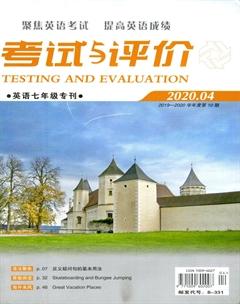Unit 7 词语和句型考点归纳
秦英
【词语精讲】
1. message n. 信息;消息
message用作名词,常用作可数名词。常用搭配take a message意为“捎个口信;传话”;
leave a message意为“留个口信”。如:
There is a good message for you. 有个好消息要告诉你。
Can I take a message for you? 要不要我帮你带话?
2. visit v. 拜访;参观
visit用作动词,意为“拜访;看望;参观;游览”,其后既可接人,也可接地点。如:
He wants to visit her sister in Beijing. 他想去看望住在北京的姐姐。
His wish to visit Changsha has at last come true. 他想去长沙的愿望终于实现了。
拓展: visit也可用作名词,意为“访问;游览”。如:
This is my first visit to London. 这是我第一次游览伦敦。
3. sit v. 坐
sit用作不及物动词,意为“坐;就座”,侧重强调“坐着”的状态; sit也可用作及物动词,意为“使……就座”,侧重强调瞬间的动作,不可与表示一段时间的状语连用。如:
He sits at his desk studying. 他坐在桌旁学习。
She sits the baby on the grass. 她让婴儿坐在草地上。
拓展: sit down意为 “坐下”;sit up意为“坐好(入席)”;sit back意为“向后靠着坐;放松;休息”。
4. hard adv. & adj. 努力地(的);困难地(的)
(1) hard用作副词时,意为“努力地;勤奋地;猛烈地”。hardly用作副词时,意为“几乎不”,表示否定意义,并不是hard的副词形式。如:
She tries hard, but fails. 她努力尝试过,但未能成功。
She hardly eats anything. 她几乎什么都不吃。
(2) hard用作形容词时,意为“困难的;硬的”。如:
This is a hard question to answer. 这是个难题,不好回答。
The ground is as hard as stone. 地面像石頭一样坚硬。
拓展: hard意为“猛烈地”时,同义词是heavily; hard意为“困难的”时,同义词是difficult,反义词是easy; hard意为“硬的”时,反义词是soft。
5. country n. 国;国家
country用作名词,意为“国;国家;乡下;乡村”;the country意为“全国人民”;in the country意为“在乡下”;over the country意为“在全国”;go to the country意为“去乡下/郊外;举行大选”。如:
China is a developing country. 中国是一个发展中国家。
The country is very green in spring. 在春天,乡村一片绿意。
辨析: country & countryside
country用作名词时,通常表示“国家”,只有在某些情境下有“农村、乡村”的含义,侧重指区别于城市的乡间、乡下。country作“国家”解时,可与不定冠词连用;而作“乡村”解时则是与定冠词一同出现。而countryside只有“乡下;农村”的意思,侧重强调物理区域感。如:
She prefers living in the country to being in the town. 她宁愿住在乡下也不愿意住在城镇。
I bought many pictures of the Chinese countryside. 我购买了许多关于中国农村的图片。
6. on (a) vacation 度假
on (a) vacation= on a holiday,意为“度假”,常与be连用,表示“在度假;放假期间”。如:
Im on vacation in Nanjing with my parents. 我正和我的父母在南京度假。
Im going with my family on a vacation next week. 下周我要和我的家人去度假。
拓展: go on vacation意为“度假;去度假;开始度假”。如:
I will go on a vacation with my family. 我要和家人去度假。
His family go on vacation in Singapore. 他全家去新加坡度假。
【短语链接】
1. summer 夏天 → summer school 暑期学习班 → summer vacation 暑假
2. weather 天气 → in a rainy weather 在雨天 → in a sunny weather 在晴天
3. call → call on sb. 拜访某人 → call after 以(某人的)名字命名 → call in 召集
【短语串串】
1. play computer games 玩电脑游戏 2. not bad 还不错 3. have a good time 玩得开心 4. study at ones home 在某人家中学习 5. take a message for sb. 为某人带消息 6. call sb. back 给某人回电话 7. right now 现在 8. no problem 没问题 9. visit some of my old friends 拜访我的一些老朋友 10. study hard 努力学习 11. be on vacation 在度假 12. write to sb. 给某人写信 13. next month 下个月 14. drink orange juice 喝橙汁 15. take a photo of sb. 给某人照相
【难句解析】
Hows it going? 近来可好?
这句话是英语中进行问候时的常用寒暄用语,相当于汉语中的“近况如何?”“身体可好?”“一切还好吗?”多用于口语场合或非正式的书面(如和朋友通信等)。还可以问: Hows your summer vacation going? 你暑假过得怎么样?常用回答有:
1. Fine! 很好! 2. Pretty Good! 非常好! 3. Not bad. 还不错。

